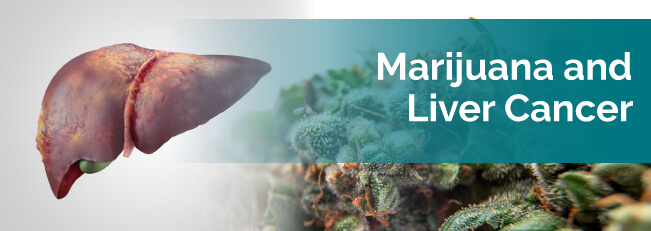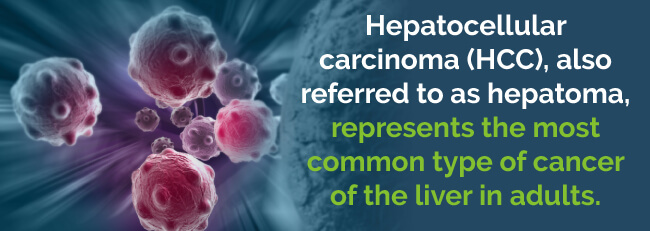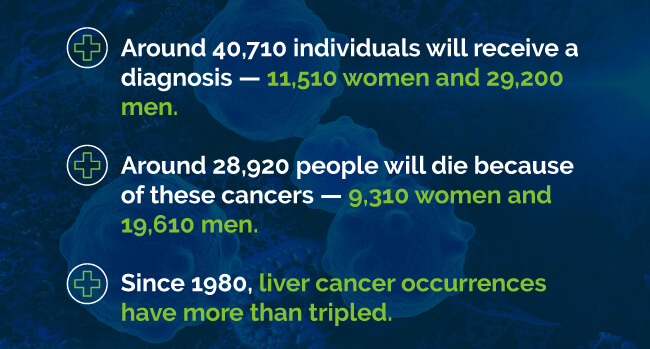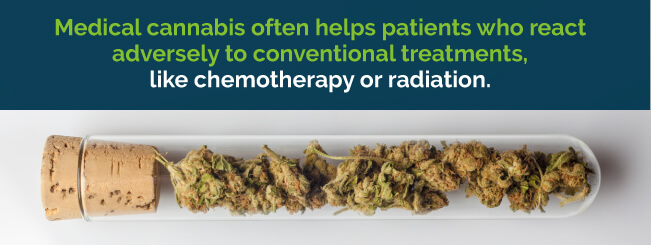
Although cancer is a medical disease researchers study heavily, it’s still complex in terms of its definitive cause, symptom management, optimal treatment and potential cure. Recently, however, multiple studies worldwide have tapped into the therapeutic healing benefits medical marijuana for liver cancer provides patients, particularly for symptoms occurring from conventional cancer treatments.
The liver is the largest organ inside the body and is located just below the ribs on the right side. The liver has many functions. It filters waste and other harmful materials from the blood. It produces enzymes and bile that help with digestion. And it produces chemicals and hormones necessary for regulating many body functions. Liver cells are called hepatocytes. Liver cancer is classified as either primary, starting in the liver, or secondary, spreading to the liver from cancer in another part of the body. Hepatocellular carcinoma is the most common form of primary liver cancer. It develops in the liver cells and damages other healthy liver cells. Continuous growth of cancerous hepatocytes can cause malignant or cancerous tumors to form. In its early stages, liver cancer does not produce many symptoms and is hard to detect. As the cancer grows, symptoms such as abdominal pain and bloating, weight loss, nausea, vomiting, fatigue and jaundice or yellowing of the skin and eyes may appear. While doctors do not know exactly what causes liver cancer, chronic liver infections such as viral hepatitis B and C and cirrhosis of the liver can increase a person’s risk for developing the disease. Men are more likely to develop liver cancer as are people over the age of 60. There are different treatment options available depending on the type and stage of the cancer. Surgery or a liver transplant are options only if the tumor is small and contained within the liver. If the tumor is very large or has spread beyond the liver, chemotherapy or radiation may relieve symptoms and prolong life, but this is not a cure. Learn more below about how medical marijuana can help treat liver cancer.
When you have cells in your body that start growing out of control, this is how cancer begins. Just about any cell in any area of your body can turn into cancer, spreading to other body parts. Liver cancer is the only cancer that begins in your liver. To gain an understanding of liver cancer, you’ll benefit from knowing about the normal function and structure of your liver.
Your liver is your biggest internal organ. It sits beneath your right lung under your right ribs. It’s separated into lobes. You can’t live without this essential organ, and it serves some important functions, such as:
Hepatocytes, or cells, make up most of your liver. Other types of cells make up your liver as well, including cells that line your bile ducts, the small tubes in your liver, and cells that line your blood vessels. Bile ducts stretch out of your liver carrying bile to your gallbladder or intestines.
These various cell types in your liver may form benign, or noncancerous, and malignant, or cancerous, tumors. The tumors each have their own cause, treatment and prognosis.
Hepatocellular carcinoma (HCC), also referred to as hepatoma, represents the most common type of cancer of the liver in adults. It starts in your hepatocyte, or main liver cell. Other less-common liver cancers include hepatoblastoma and intrahepatic cholangiocarcinoma.

There are different growth patterns in hepatocellular carcinoma that include:
Hepatoblastoma develops in children and is a rare type of cancer. It afflicts children younger than four years of age. Hepatoblastoma cells are comparable to fetal liver cells. Chemotherapy and surgery successfully treat around two out of three children who have these tumors. When the tumors begin spreading outside the liver, they’re harder to treat.
Intrahepatic cholangiocarcinomas make up between 10 to 20 percent of liver cancers, according to the American Cancer Society. They begin in your small bile duct cells in your liver. The majority of cholangiocarcinomas start outside your liver in the bile ducts.
Throughout the African black population south of the Sahara and in the Far East, primary liver cancer is common, as reported in the book “Liver Cancer.” Caucasians in southern Africa have a lower occurrence of primary liver cancer compared to U.S. incident rates.
Cholangiocellular carcinoma and hepatocellular have their maximum prevalence and occurrence of primary large bowel cancer.
Secondary cancer incident rates in the liver are equivalent to the occurrence of primary cancer. In the U.S. and Europe, primary large bowel cancer with a consequence of metastases to the liver is common. Lung, stomach, breast and pancreas cancer are also common and lead to metastases to the liver.

Common physical symptoms of liver cancer may include:
A liver cancer diagnosis can also bring about social and emotional effects, like:
You may have issues expressing how you feel to your family and friends. Others might not know how to respond to you.
It can help to open up and share your feelings with your family and friends or a health care professional. Although emotions can affect some individuals differently than others, everyone can benefit from support and help through family and friends, professional counselors, support groups, religious groups or others.
Estimates by the American Cancer Society for intrahepatic bile duct cancer and primary liver cancer in 2017 in the U.S. are:

Figures for liver cancer, according to the American Society of Clinical Oncology (ASCO):
The treatment you receive for liver cancer depends on several factors, including your age, the severity of the disease, your general health and your personal preference. Common liver cancer treatments may include the following.
Surgeries surgeons use to treat liver cancer include:

Side effects of surgery may include swelling and pain around the incision site, appetite loss, bleeding, numbness or drainage from the surgery site.
Your doctor administers localized treatments directly to your cancer cells and the area that surrounds them. Some options of localized treatments to treat your liver cancer may include the following.
To destroy cancer cells with extreme cold, your doctor uses cryoablation. Your physician places a cryoprobe that contains liquid nitrogen directly on your liver tumor. Using ultrasound images to guide and monitor, they freeze the cells. Side effects of this treatment may include irritation or redness of your skin and tingling or numbness.
Your doctor performs the radiofrequency ablation procedure to heat cancer cells with electric current and destroys them. He uses a CT scan or ultrasound as his guide while he inserts a thin needle into your abdomen through a small incision. Side effects may include bleeding, nerve injury, infection, paralysis or long-term numbness.
Through a procedure known as chemoembolization, your doctor injects potent anti-cancer chemotherapy drugs into your liver. Side effects may include nausea or vomiting, pain and fever.
Your doctor injects pure alcohol directly into your tumor during surgery or through your skin. Alcohol kills the tumor cells. Side effects may include muscle weakness, numbness, nerve pain or tingling.
To shrink tumors and destroy cancer cells through radiation therapy, your doctor uses high-powered energy sources like protons and X-rays. The machine directs the energy carefully to your liver while preserving the healthy tissue that surrounds it.
You’ll lie on a table during the external beam radiation treatment while your doctor guides the machine that directs energy to a particular point on your body. If your physician uses stereotactic radiosurgery therapy, they’ll use a machine that focuses many radiation beams at one point in your body simultaneously. Side effects may include dry mouth, shoulder stiffness, fever, nausea, diarrhea and vomiting. There can be both short-term and long-term side effects of radiation therapy.
Targeted drugs interfere with certain tumor abnormalities. They slow down or stop cases of hepatocellular carcinoma from getting worse. Treatment lasts a few months. Side effects may include blood clotting, skin problems, gastrointestinal perforation or high blood pressure.
Supportive, or palliative, care provides relief from pain and other symptoms. It focuses on improving quality of life. It’s a specialized medical care where you’ll be working closely with a palliative care specialist. Palliative care complements other aggressive treatments, like surgery, radiation therapy or chemotherapy.
Researchers over the past couple years have brought to light new evidence that supports the therapeutic potential of marijuana in different types of cancer, including glioma, bladder, breast and leukemia. Now, a group of researchers is studying the benefits of marijuana for liver cancer, particularly hepatocellular carcinoma.
When you have advanced liver cancer, alternative treatments can ease your pain. Different types of alternative medicine include:
To date, studies on cannabinoids and their effect on liver cancer show that cannabinoids not only can prevent the dividing of tumor cells but may even kill cancer cells. Besides potentially stopping proliferation, there are several ways cannabinoids may help to tackle cancer. They are by:
Since liver cancer is a leading cause of cancer death and difficult to treat in late stages, the authors of this 2011 paper covering the effect of cannabinoids on liver cancer cells wanted to explore alternative treatments. Building off previous research on cancer and cannabinoids, they focused on liver cancer’s response to cannabis.
The team observed THC and the CB2 receptor in their methods. To simulate their effect on liver cancer, they administered THC to isolated cells. Applying THC lowered the viability of the cancer cells, implying the CB2 receptor could be involved. They verified its connection by repeating the process and adding a CB2 blocker. During this second attempt, the THC had no effect, indicating that the CB2 receptor inhibited the cancer cells.
After observing THC’s anticancer benefits, the researchers investigated how it worked with the CB2 receptor to take effect. Previous research showed cannabis kills cancer cells by triggering autophagy, or cell turnover. When the team exposed the cancerous tissue to THC, they found an increase in substances responsible for autophagy. They then blocked autophagy-related substances and examined if cannabis-related cell death still happened. Blocking them severely reduced cell death, showing autophagy was related to the process.
Several smaller studies of smoking cannabis found it reduces or stops nausea and vomiting in patients receiving chemotherapy.
As mentioned, some symptoms of liver cancer are upper abdominal pain, appetite loss, anxiety, sadness and stress. Marijuana and liver cancer treatment can be an effective in addressing these symptoms. Certain strains help with certain symptoms, as you will see below.
Patients with liver cancer have experienced improved well-being when using medical weed. Medical cannabis often helps patients who react adversely to conventional treatments, like chemotherapy or radiation.

Chemo and radiation trigger adverse side effects like nausea, vomiting, lack of appetite, extreme body pain and fatigue, whereas marijuana doesn’t. Thankfully, you have medical weed strains available to you that can relieve specific symptoms of cancer and its treatment’s unpleasant side effects so you may get back to normal life. Beneficial cannabis strains include:
The effects of cannabis for liver cancer can depend on how the weed enters your body. When you take it orally, like in baked goods such as edibles, your body absorbs the THC poorly, and it may take several hours before you find any relief. Once absorbed, your liver processes it and generates a second compound that’s psychoactive. This compound acts on your brain and changes your consciousness and mood affecting your brain differently than THC.
When you smoke or vaporize, or inhale, cannabis, THC enters your bloodstream and quickly moves to your brain. The effects generated by inhaling weed fade faster than when you take it orally because your liver produces that second psychoactive compound in smaller amounts.
Patients who find success with medical cannabis use highly concentrated cannabis oil. Cannabis oil is made into a whole-plant extraction separating all marijuana resin from plant material. Other methods of cannabis and liver cancer treatment may include:
When seeking relief from your liver cancer symptoms, you can begin by searching for a medical marijuana dispensary or doctor. After you find one, your doctor can help you find the right strains for your symptoms.
Find A Doctor Find A Dispensary